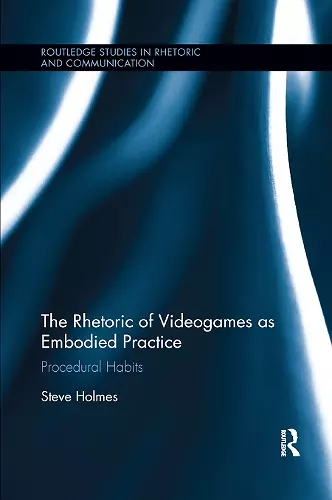The Rhetoric of Videogames as Embodied Practice
Procedural Habits
Format:Paperback
Publisher:Taylor & Francis Ltd
Published:10th Dec '19
Currently unavailable, and unfortunately no date known when it will be back
This paperback is available in another edition too:
- Hardback£160.00(9781138303270)

The Rhetoric of Videogames as Embodied Practice offers a critical reassessment of embodiment and materiality in rhetorical considerations of videogames. Holmes argues that rhetorical and philosophical conceptions of "habit" offer a critical resource for describing the interplay between thinking (writing and rhetoric) and embodiment. The book demonstrates how Aristotle's understanding of character (ethos), habit (hexis), and nature (phusis) can productively connect rhetoric to what Holmes calls "procedural habits": the ways in which rhetoric emerges from its interactions with the dynamic accumulation of conscious and nonconscious embodied experiences that consequently give rise to meaning, procedural subjectivity, control, and communicative agency both in digital game design discourse and the activity of play.
"This book offers scholars in game studies and rhetoric and composition a much needed theoretical lens for examining how habit, or hexis, creates a rhetorical force in games." – Rebekah Shultz Colby, University of Denver
"The Rhetoric of Videogames as Embodied Practice points us to a massive blind spot in the field of digital rhetoric—the mundane technologies that persuade us. The habits that emerge from our engagement with such technologies have not yet been a central concern to those studying rhetoric and digital games, and Holmes provides us with an impressive theoretical toolkit to remedy that problem." --James Brown, Rutgers University-Camden
"In The Rhetoric of Videogames as Embodied Practice, Holmes provides an important, even transcendent perspective about how fields such as rhetoric, composition, and writing studies might study videogames in ways that go beyond traditional approaches that have often limited how and what videogames are studied." --Sean Morey, University of Tennessee, Knoxville
ISBN: 9780367890902
Dimensions: unknown
Weight: 453g
274 pages